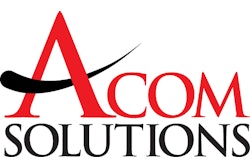Accenture: Increase underscores growing reliance on 3PLs to support expanding international operations
New York — October 27, 2004 — American manufacturers are allocating a greater percentage of their total logistics operating budgets to third-party logistics (3PL) provider services than ever before, according to a study released today by Accenture and Northeastern University.
The study, now in its 13th year, is based on surveys of two groups: 60 chief logistics executives of the 500 largest manufacturers in the United States, and nearly 50 chief executive officers of the top third-party logistics providers. While the surveys of 3PL providers in previous years were limited to North America, this year's survey was expanded to include CEOs from Europe and Asia-Pacific.
According to this year's study, American manufacturers allocated 40 percent of their logistics operating budgets in 2003 to third-party logistics provider services, compared with between 19 percent and 30 percent in the prior four years.
The study also found that while approximately the same number of American manufacturers in this year's study as in the prior year said they employed third-party logistics services, the proportion of services allocated to international operations has grown. In this year's study, 80 percent of American manufacturers said they utilized 3PL services in both domestic and international operations, compared with 69 percent in last year's study.
"The growing share of budget consumed by third-party logistics services reflects American manufacturers' continued satisfaction with the benefits delivered by the providers," said Brooks Bentz, an associate partner in Accenture's Supply Chain Management practice. "It also underscores the growing reliance on third-party providers to support the expanding international operations of American manufacturers."
CEOs of North American 3PL providers seem to take a positive view of the manufacturing globalization trend. While 10 (43 percent) of the 23 surveyed North American CEOs said that off-shoring of manufacturing from North America has affected their company's North American operations, most characterized the affect positively in terms of providing opportunities for new and expanded services. In fact, only one (10 percent) of the 10 North America CEOs said the movement had a negative impact.
"Globalization of manufacturing operations continues to present an enormous opportunity for third-party logistics providers," said Professor Robert Lieb of the College of Business Administration at Northeastern University. "By extending their supply chains across countries and sometimes continents, manufacturers have developed new requirements such as import processing, international freight forwarding, customs brokerage and de-consolidation facilities at U.S. ports. Third-party logistics providers are well-positioned to provide these capabilities."
For the first time, the study polled CEOs of third-party logistics providers in Europe and Asia-Pacific, in addition to North America. Among the findings:
* CEOs in all geographies projected double-digit growth in company revenue during the next year as well as over the next three years. On average, respondents in North America said they expect 12 percent revenue growth this year and 14 percent annually over the next three years; those in Europe expect 15 percent growth this year and 19 percent annually over the next three years; and those in Asia-Pacific expect 19 percent growth this year and 17 percent annually over the next three years.
* CEOs in all geographies also projected significant growth in overall industry revenue. On average, respondents in North America expect one-year industry revenue growth to be 9 percent and three-year annualized growth to be 10 percent; those in Europe projected one-year industry growth of 10 percent and three-year annualized growth of 11 percent, and those in Asia-Pacific projected both one-year and three-year annualized growth of 15 percent.
* CEOs in North America and Europe identified downward pressure on pricing as the most important industry dynamic in their regions, while CEOs in Asia-Pacific said growth of the Chinese economy is the most important industry dynamic in that region.
* The majority of CEOs in each market indicated that the high cost and low return on IT investments is a significant problem, cited by 60 percent of respondents in North America, 77 percent in Europe and 70 percent in Asia-Pacific.
* The ability to find and keep qualified people is a greater problem in North America than in other markets, cited by 60 percent of CEOs in North America versus 54 percent in Asia-Pacific and 46 percent in Europe.






